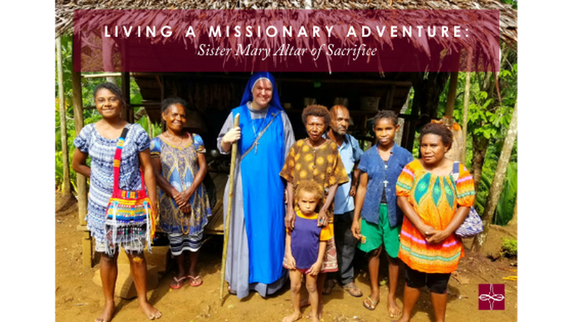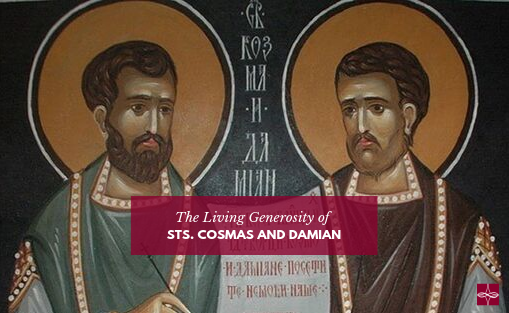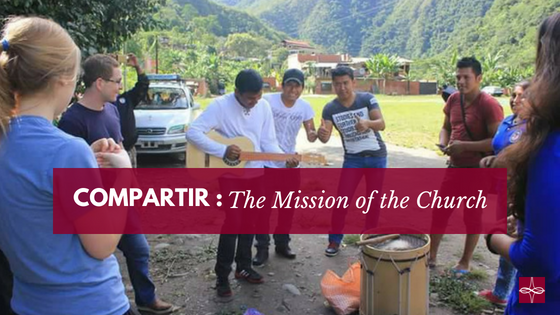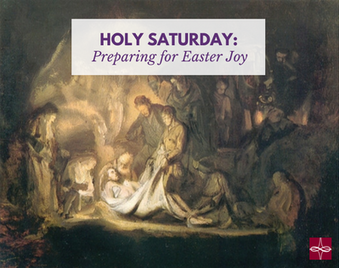|
As the Church prepares to celebrate World Mission Sunday, we invite you to read this post from Sister Mary Altar of Sacrifice about her missionary vocation. When I was in seventh grade, about the age of 12, I decided to plan my life. I thought that I urgently needed to have an idea and start preparing for my future. I decided that I would be a missionary. I wanted to go to Africa and care for the children, especially those in most need. I always desired to adopt many children, including many with different disabilities. However, the missing piece of my life puzzle was that I didn’t even know what “being a missionary” really meant, and I had never thought about how my vocation would fit into my life either. As time went on, I realized that it was true that I loved to be around and work with children, and I had a great desire in my heart to go out to the whole world to help those in most need. However, I also discovered that God had a very special calling and plan for me, to use me as His instrument. As Mother Teresa said, “I am a little pencil in God’s hands. He does the thinking, He does the writing. He does everything and sometimes it’s hard because it is a broken pencil and He has to sharpen it a little more.” My name is Sister Mary Altar of Sacrifice, and I grew up in Kansas City, Kansas and went to Catholic school my whole life, from kindergarten through college. Thanks be to God, I was given a Catholic upbringing not only at school but also at home. Although I have a truly bad memory, I distinctly remember the different moments of the sacraments in my life, and I believe that it was the grace of the sacraments that opened my heart and led me to discover my religious and missionary vocation. Preparing for First Communion, I remember arguing with my mom about not wanting to wear the fancy white dress. I really disliked dresses because I was a tomboy who grew up with 3 older brothers. However, I understood the importance of the sacrament and was so excited to receive Jesus that I knew that I had to look my very best! It wasn’t until I was preparing for the sacrament of Confirmation that I began to take my Catholic faith seriously and hold it as my own. Our religion teacher told us “this is the moment (Confirmation) that you become an adult in the Church and have to take your faith as your own, so you must decide what you will do with it!” After that, I continually got more involved in the Church throughout high school by joining the youth group, aiding with junior high youth group, lectoring, being a Eucharistic Minister, leading retreats, frequenting the sacraments of confession and communion, etc. I also had the opportunity to do a 2-week mission trip to Peru, which confirmed my early desire to do mission work abroad. The experience of leaving all behind to go serve another was exciting and invigorating. I could concretely see that these people materially were poorer than I, but to see the richness of the treasure of their faith was enlightening. Finally, the time came for me to decide which college I would go to. I decided instead that I would do a gap year of service in another country, but my parents had other plans for me, so my “missionary adventure” was put on hold. Thanks be to God, I decided to go to Benedictine College, where I fell even more in love with Jesus and my Catholic faith, discovered my religious vocation, and finished my degrees in Elementary and Special Education. A month after graduation, I entered the convent in Washington D.C. with the Servants of the Lord and the Virgin of Matara, a missionary order founded in Argentina and currently in over 40 countries. When I visited them for the first time during college, there was a moment of actual grace that I understood this is where God was calling me to fulfill my vocation, and here, He would fulfill all the desires of my heart. I could see the puzzle pieces all fit perfectly together. Now, I am currently a missionary in Papua New Guinea in Oceania and have been here for just over a year. My main apostolate (or missionary work) is in the Primary School of our parish, teaching and working to bring a higher level of integral education to our students. Since I have entered religious life, every day has been a “missionary adventure.” However, being a missionary doesn’t just mean going to another country. Through our Baptism, we have been called to follow Jesus and sent to be missionaries to the world. The first step is to evangelize ourselves. We must look at our life and ask, “am I truly living the Gospel in my daily life and following Jesus in everything I think, say, and do?” Then, we must complete Christ’s mandate to love our neighbors and bring the Gospel to those closest to us. Sometimes, this is even more challenging than leaving our own family and country to serve someone. We must learn to be missionaries in our daily lives and pray and discern to see where and how God is calling us to fulfill that mission. Some have a special calling to give their whole lives as priests or religious to do this work! In addition, God calls some—priests, religious, and laity—to be missionaries abroad. However, we, as Catholics, are all called to be missionaries. As St. Catherine of Siena said, “If you are who you were meant to be, you will set the world on fire!” So, I invite you to pray for the missions and all missionaries in the world in a special way during this month of missions, but also I invite you to take some time to listen and pray about how God is calling you to be a missionary in your life. For more resources on Vocational Discernment, please click here. **This post was originally published on 11/3/2020. AuthorSister Mary Altar of Sacrifice serves as a religious missionary in the Diocese of Vanimo, Papua New Guinea
0 Comments
Today is the optional memorial of Sts. Cosmas and Damian, who were twin brothers born in the third century in Arabia. Both Cosmas and Damian became physicians, and in true Christian charity, refused to accept payment from their patients. During the persecutions under Roman Emperor Diocletian, the brothers’ renown in their Christian community made them easy targets. They were imprisoned and tortured by various means in an effort to force them to recant their faith, and after surviving most of these tortures while remaining true to Christ, Cosmas and Damian were finally beheaded.
What draws me to the story of Sts. Cosmas and Damian is not only their adherence to the faith while under excruciating torture, but also their unfailing generosity to those around them. They tended the sick in their community and did so without asking for or taking any monetary compensation. I like to think this was because they were often helping sick people who were also too poor to afford a physician in the first place. Generosity is a virtue that can easily be motivated by pride—we do good things for others, secretly hoping to get accolades or some kind of reward for being so self-giving. But I think generosity is really about giving to others —material, spiritual, or emotional—because you know the other will benefit, even if there is no compensation for you in return, or if (like Cosmas and Damian) you refuse to take any. Generosity is not only exemplified by a wealthy man donating money to charitable causes, nor only by going on mission trips to help those in poverty, nor is it demonstrated by showering poor children with gifts at Christmastide. We can cultivate the virtue of generosity in ourselves much closer to home and on a daily basis—just as St. Cosmas and St. Damian did. Generosity is lived out by a talented musician volunteering at his church to worship God in song, or by a mother who prepares and brings home-cooked meals to other families in her parish who have a new baby or have had a recent surgery. There is also spiritual and emotional generosity: being present and available to our siblings, children, parents, or friends as they struggle with transitions or discernment. When we engage in these acts of generosity, we serve Christ by serving others—even if it is not necessarily a sacrifice for us to do so. (Although I know for myself, the sacrifice that comes with being generous is striving to be selfless in my generosity and not to expect or desire reciprocation.) We are called to use anything that we have been given in order to glorify God. And what about those—presumably poor—people that Sts. Cosmas and Damian healed and treated? Who knows what kinds of generosity they were able to offer to their benefactors as a result of their encounter with the twin saints? Maybe they were generous in their prayer lives and interceded for the physician brothers. Maybe they were inspired by the generosity and faith of the two saints and went on to assist others in their community. Even if we cannot always be materially generous to each other, giving of ourselves in any capacity can cause a ripple effect of generosity throughout our communities. We can also learn to support and foster the generosity of others by thinking about how we respond when we are offered someone’s generosity, whether we asked for it or whether it was volunteered to us. Personally, I am working on asking for help or accepting generosity with humility. I know that I am less likely to help someone if they repeatedly protest my efforts or insist that I am doing too much, and therefore I try not to protest or downplay the good work that someone does for me. I try to remind myself that by serving each other, we are ultimately serving Christ. Questions for Reflection: Have you ever been the recipient of an act of generosity that changed your life? How so? "Rather than seeing summer as the “down time” at a church, commit to approach the coming months with the intention of fostering experiences of active service, quiet prayer and contemplation, and stimulating intellectual work or professional training."
Having worked at a handful of churches, I have observed that the summer is the slowest time of year for parish life. Parishioner’s schedules are all over the place, especially if there are children or teenagers involved, with vacations, camps, etc. During the summer, parish programs tend to slow down (However, some parishes will run a Vacation Bible School, or similar camp-like program). But summer doesn’t have to be a long spiritual nap. In fact, the summer can be a very important time and opportunity for a church, especially for church staff. How you approach the summer can greatly shape the year ahead. Besides the celebration of the Mass, the summer provides a number of unique opportunities for spiritual growth in areas that aren’t always possible throughout the rest of the year. Here are a few opportunities for spiritual growth you might consider for your parish. Parish Mission Trips Many parishes host mission trips—whether local, national, or international. Consider prioritizing mission trips and extending the opportunities to different ages and areas. Some of my best summer memories are the trips I went on to rural Appalachia in high school. These trips instilled in me a call and love for ongoing service in my faith. Plan opportunities not only for parish staff, but also for families to serve together. Make it memorable and accessible. Let missions be an opportunity to get beyond the model of Christian ministry as something that only happens at your church. And remember to report back on the trip through photos, stories, or results to your parish. People love hearing about the activity in their parish community. It creates a sense of energy and momentum that can get carried into fall activities, especially in a youth ministry context. A service trip provides something concrete participants can point to and share with friends, family, or parishioners. I’ve also found that the more “on the fence” parishioners that are hesitant to get involved often take that first step after seeing the fruit of service. Most importantly, participants inevitably leave with a transformed, deeper experience of their faith and a lived experience of Jesus in his ministry to the broken places in need of healing. To find some long-term and short-term mission and service opportunities, click here. Retreats Work at the church never stops, but it does slow down. When is the last time your staff or ministry team spent time away, even just for a day or afternoon, from the office environment together and prayed? There are gorgeous retreat centers and shrines in every state that too often only get visited in the dead of winter. The Christian writer and philosopher Dallas Willard once said, “The greatest threat to devotion to Christ is service for Christ.” He was talking about our tendency to view prayer and contemplation as less fruitful compared to active ministry. Prayer is essential not only to any parish ministry, but to the Christian life overall. Invite your team to pray regularly or be renewed by attending a retreat. Priests are also required by Canon Law to take a retreat. Make sure your parish priest is getting the time off he needs to pray and reflect. If you or your staff is on retreat, pray for your parish priest throughout that time. Staff Development With all the conferences, classes, symposiums, etc., that happen on college campuses or churches throughout the country, summer is a great time to invest in the development of staff and volunteers. Look for opportunities to enhance your team’s intellectual and professional skills. Be flexible and open to new ideas where you and your staff can connect with other professionals or get inspired. If your parish has room in the budget, propose a conference you are passionate about or that will help your work. If you’re a liturgy or music director, take your ministers or musicians out to see a concert of sacred music or take a tour of a cathedral or museum. Rather than seeing summer as the “down time” at a church, commit to approach the coming months with the intention of fostering experiences of active service, quiet prayer and contemplation, and stimulating intellectual work or professional training. You might notice that rather than mustering the energy to get “back in gear” as summer draws to an end, you will feel renewed, enriched, and equipped for the “busy time” ahead. Moreover, you may draw closer to other others working at the parish and be more integrated as a staff, youth group, or ministry team. This can be a leaven to your ministry and parish for the rest of the year. Finally, make sure you have some fun while you’re at it; it is summer after all. *This post was originally published on the Ad Infinitum Blog on June 2, 2016. “For even as the body is one and yet has many members, and all the members of the body, though they are many, are one body, so also is Christ.” (1 Corinthians 12:12)
Frequently in the bible, we read that we are all members of one body, making up the church in our world. We must work as one body, sharing as one large group, the church. Although I’ve heard and read this teaching several times, for most of my life I still saw the church as a building. Sadly, this imagery left me with gaps in my understanding which impacted my spiritual life. In Spanish, the word “compartir” means “to share.” One of the biggest impacts that mission and life in Bolivia has had on my spiritual life is the “compartir” culture. Not only do people share with their friends and the people they know well, but they share with everyone. I am currently serving as an overseas lay missioner at the Universidad Academica Campesina-Carmen Pampa (UAC). So far in my time here in Carmen Pampa, Bolivia, I have witnessed everyday acts of sharing. People don’t always have much, but they are always happy to share what they do have. On campus, students have shared their snacks with me. A student invited me to his home to share about Bolivian culture with me. Whenever students attend events and are asked why they chose to come, the resounding answer is simple: “compartir.” Their desire is to share. I learned a great lesson on what it means to share while on a recent trip to a local town with a group of students in Pastoral, the campus ministry group at the UAC. It was a day full of activities to get to know one another: we played games, shared in music, celebrated mass, and ate wonderful food. I had a great time and really got to know some of the students better. I was amazed by the way that everyone shared their time and energy, even when it would have been easier to let someone else take charge. Because I was so amazed by all of the sharing, I was caught off-guard by a conversation that occurred a few days later at our Pastoral group meeting. The group leader asked each person to share a reflection about the trip.The first student to speak shared that she thought the trip had been “mas o menos”, “more or less.” I was a bit confused. As we continued around the circle, many people voiced similar thoughts. I was shocked that the trip I thought was so beautiful had left others feeling disappointed. Then someone started to go deeper: the reason many people had felt a little discouraged was because during most of the trip, people had been in separate groups—one group working on the cooking, one group singing, one group playing soccer. We hadn’t truly been sharing as one. I thought back to what was the most powerful part of the trip to me, and I realized that it had been in mass. The church was small and made of cement. It had plain, cracked windows, and we sat in red plastic chairs. But during mass, we had all come together as one group to share in praise to God, to share in the word of God, and to share in the Eucharist. It had been so powerful because we were all there as one. I want you to close your eyes now and come up with an image of church. I’ll admit that every once in awhile, I’m still going to picture a building. This building may have the most pristine stained glass windows, with beautiful mahogany pews, and a perfectly polished tabernacle. But no matter how beautiful the building may be, this image still leaves gaps. Because no matter how many people are packed in that church, there are still hollow spaces when it is just a building. Like Jesus taught us, we are the church. As the church, it is our mission to act as the body of Christ here on earth. The truth is that we aren’t truly acting as the hands and feet of Christ until we use those limbs to reach out and share. And reaching out isn’t a task we were made to do on our own. Christ’s body was made to work as one unit. When we spread the gift of sharing as one people, we begin to fill voids. The desire of my students to share and to work together as one community and one body has been such a powerful experience. I am still learning what it means to truly “compartir” each and every day. I’m learning how to see myself as a part of a larger, complete body. In embracing this life of sharing, I have found myself more deeply appreciating my time with others, as a part of God’s church, and so becoming closer to Him and to His people. To learn more about service opportunities through Franciscan Mission Service, please click here. Editor's note: This blog was originally published through the Catholic Volunteer Network in May 2018. It has been reposted with permission. Magdalene Van Roekel is a volunteer with Franciscan Mission Service It’s Holy Saturday. Jesus is dead; a boulder is in front of the tomb, and it is sealed. He is gone. So now what? What next? On Holy Saturday, my thoughts are with the apostles. Although Jesus foretold of his death, I’m not sure that they actually believed him or that they imagined it would consist of the sacrifice on the Cross. But Holy Saturday is when the reality hits them. Just imagine the millions of questions that they must have had. I imagine that they were similar to the ones above. “Now what? What next?” Imagining the disciples left with these unsolved questions, I start to realize that I too have had some questions when the going got tough or when I faced challenges, like on a recent mission trip. A few weeks ago, I had the privilege of accompanying 18 students from The Catholic University of America and two other staff members to the island nation of Jamaica for an alternative spring break cultural immersion trip. While in Jamaica, we visited several sites run by organizations like the Missionaries of Charity, the Missionaries of the Poor, and the St. Patrick’s Foundation. The most impactful day for me was the one I spent at Bethlehem House. Bethlehem House is a home for children with severe mental and physical disabilities. Of the eighty children who live there, only about twenty receive the occasional visit from their families. The rest of the children likely never see their families again. Most of them will also never be able to live on their own without significant medical assistance. The missionary in charge of the home asked if I would work with the older children, telling me that these children get the fewest visitors either by family members or by outside groups. “They need your love more than anyone else here,” he told me as he dropped me off in the room. It was just me, a caretaker (who only spoke Patois, a native language of Jamaica that is a mix of Scots and Creole) and the children. For the first hour, I didn’t know what to do. I was dumbfounded, heartbroken, and depressed by their situation. I could barely even crack a smile, let alone laugh. I didn’t understand the joy that others had talked about working with this group of children. I was aimlessly walking around the room, wondering, “What next?”. As one hour turned into two, one of the children woke up from a nap. He shouted from across the room “Hey! Hey you!” I looked at him and he said, “Come here and pick me up!” Still dumbfounded, I walked over to his crib and picked him up. He quickly told me that his name was Ashanti. Ashanti was one of the few children who was able to have a full conversation. He had such severe scoliosis that he was paralyzed from the waist down and had a lump in his back. Ashanti also had an enlarged, misshapen head. After about five minutes of walking around and talking with me, he grabbed my beard and declared that I was his best friend. He smiled and let out the most infectious laugh I have ever heard! In that moment, I knew that I was not looking just at Ashanti’s face, but at the very face of Jesus laughing and expressing joy. I learned more about love in those five minutes then I had learned in years. The rest of my day at Bethlehem House was full of joy, even in the midst of such extraordinarily difficult circumstances. In reflecting about that day, I think about the apostles on Holy Saturday who had locked themselves away in the Upper Room, unsure of what was next. They wondered and waited. But Easter did come, and their joy returned. The face of Jesus did appear again, just as it had for me in my experience with Ashanti. After Easter and with that joy, the apostles went out into the world proclaiming the Gospel. We too are called to encounter Christ in the joy of Easter and spread the Gospel message. More often than not, our days are like Holy Saturday. We experience days when all seems lost and hope seems foolish. But we must resist that temptation, resist the idea that hope will not return, that joy is lost forever. We know that Easter is coming and will always come. Joy will have its triumph. And it can be shared and experienced by all those we encounter. So on this Holy Saturday, let us be like the apostles and go out into this world after experiencing the joy that awaits us on Easter Sunday! For more Lenten and Easter resources, please click here. "Rather than seeing summer as the “down time” at a church, commit to approach the coming months with the intention of fostering experiences of active service, quiet prayer and contemplation, and stimulating intellectual work or professional training." Having worked at a handful of churches, I have observed that the summer is the slowest time of year for parish life. Parishioner’s schedules are all over the place, especially if there are children or teenagers involved, with vacations, camps, etc. During the summer, parish programs tend to slow down (However, some parishes will run a Vacation Bible School, or similar camp-like program). But summer doesn’t have to be a long spiritual nap. In fact, the summer can be a very important time and opportunity for a church, especially for church staff. How you approach the summer can greatly shape the year ahead. Besides the celebration of the Mass, the summer provides a number of unique opportunities for spiritual growth in areas that aren’t always possible throughout the rest of the year. Here are a few opportunities for spiritual growth you might consider for your parish. Parish Mission Trips Many parishes host mission trips—whether local, national, or international. Consider prioritizing mission trips and extending the opportunities to different ages and areas. Some of my best summer memories are the trips I went on to rural Appalachia in high school. These trips instilled in me a call and love for ongoing service in my faith. Plan opportunities not only for parish staff, but also for families to serve together. Make it memorable and accessible. Let missions be an opportunity to get beyond the model of Christian ministry as something that only happens at your church. And remember to report back on the trip through photos, stories, or results to your parish. People love hearing about the activity in their parish community. It creates a sense of energy and momentum that can get carried into fall activities, especially in a youth ministry context. A service trip provides something concrete participants can point to and share with friends, family, or parishioners. I’ve also found that the more “on the fence” parishioners that are hesitant to get involved often take that first step after seeing the fruit of service. Most importantly, participants inevitably leave with a transformed, deeper experience of their faith and a lived experience of Jesus in his ministry to the broken places in need of healing. To find some long-term and short-term mission and service opportunities, click here. Retreats Work at the church never stops, but it does slow down. When is the last time your staff or ministry team spent time away, even just for a day or afternoon, from the office environment together and prayed? There are gorgeous retreat centers and shrines in every state that too often only get visited in the dead of winter. The Christian writer and philosopher Dallas Willard once said, “The greatest threat to devotion to Christ is service for Christ.” He was talking about our tendency to view prayer and contemplation as less fruitful compared to active ministry. Prayer is essential not only to any parish ministry, but to the Christian life overall. Invite your team to pray regularly or be renewed by attending a retreat. Priests are also required by Canon Law to take a retreat. Make sure your parish priest is getting the time off he needs to pray and reflect. If you or your staff is on retreat, pray for your parish priest throughout that time. Staff Development With all the conferences, classes, symposiums, etc., that happen on college campuses or churches throughout the country, summer is a great time to invest in the development of staff and volunteers. Look for opportunities to enhance your team’s intellectual and professional skills. Be flexible and open to new ideas where you and your staff can connect with other professionals or get inspired. If your parish has room in the budget, propose a conference you are passionate about or that will help your work. If you’re a liturgy or music director, take your ministers or musicians out to see a concert of sacred music or take a tour of a cathedral or museum. Rather than seeing summer as the “down time” at a church, commit to approach the coming months with the intention of fostering experiences of active service, quiet prayer and contemplation, and stimulating intellectual work or professional training. You might notice that rather than mustering the energy to get “back in gear” as summer draws to an end, you will feel renewed, enriched, and equipped for the “busy time” ahead. Moreover, you may draw closer to other others working at the parish and be more integrated as a staff, youth group, or ministry team. This can be a leaven to your ministry and parish for the rest of the year. Finally, make sure you have some fun while you’re at it; it is summer after all. |
Details
Archives
July 2024
Categories
All
|
About |
Media |
© COPYRIGHT 2024 | ALL RIGHTS RESERVED











 RSS Feed
RSS Feed